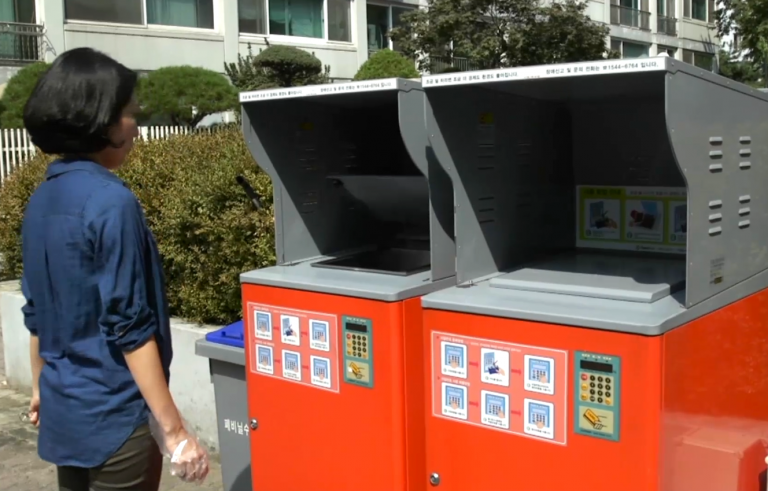(单词翻译:单击)
MORI ROTHMAN: Sujin Woo and her mother, Lee Bo-ok live in an apartment in South Korea's capital of Seoul. On this Saturday morning, Lee is making Korean fried sweet potatoes for lunch.
Some parts of the food, like the sweet potato peels, won't make the final dish, but instead of tossing them in the trash, Lee places the food waste in this special container. In South Korea, separating food waste from the rest of your garbage is required by law…and anyone who doesn't recycle food waste faces potential fines.
Seoul's 10 million residents started paying for their food waste by weight in 2013….a policy now in 16 other cities and provinces. Woo disposes of the food waste in bags bought from the city and tracks her food waste with a radio frequency ID card. Woo taps the card to register the household and dumps her food waste into the bin, which logs how much waste she'll be charged for.
SUJIN WOO: At the end of the month, depending on how much food we wasted we get charged and then we get a bill.
MORI ROTHMAN: So how much do you normally spend on that bill?
SUJIN WOO: It's only 2-3 dollars, not that much.
MORI ROTHMAN: As their economy grew over the past few decades, South Koreans started dining out more and wasting more food. The country banned all food waste from landfills in 2005. Today, Sujin and her mom say there's a difference in the way their generations think about the problem.
SUJIN WOO: I tend to have a big appetite but I also want to make sure I'm not eating too much or gaining too much weight so although it's bad to leave food I also think about my diet so I don't feel as guilty.
LEE BO-OK: Before Korea was struggling economically, but now that we live in a more prosperous society I think there's more food being wasted, because there's more variety of food as well. And I always feel very guilty if I end up wasting food.

MORI ROTHMAN: Han Sung Hyun oversees Seoul's food waste program at the city Environmental Management Division.
HAN SUNG HYUN: At first, we processed all the food waste in landfills. Then we realized the pollution it created, and wanted to find a way to recycle the waste.
MORI ROTHMAN: Hyun says the city used to spend 600-thousand dollars a day on food waste disposal- money now saved through recycling.
HAN SUNG HYUN: It actually costs a lot to process the food waste. So we were like, let us find the way to save money, also to reduce pollution, and eventually to find a way to recycle the waste.
MORI ROTHMAN: Seoul deploys special trucks to pick up food waste from apartment complexes, restaurants, and other businesses and bring them to special recycling facilities. This one handles 80 to 90 truck-loads every day.
This is one of five factories in Seoul that processes food waste. This machine dries the food waste and turns it into animal feed in just three hours.
Another byproduct of the food recycling is biogas: a mix of methane and other gases that can be burned for energy. This plant creates enough biogas to meet 90 percent of its electricity needs.
Hyun says besides assessing fines – publicizing the benefits of food recycling is key to citywide cooperation.
HAN SUNG HYUN: As the awareness increases, I can say that out of 1000 households, there are about 10-15 percent of households that do not produce any food waste at all. As we receive more support, I see we are on the right path to save the environment and more recycling.
MORI ROTHMAN: In the four years residents and businesses have been charged by the weight of their food waste, Seoul's overall food waste has decreased 10-percent, by more than 300 tons a day. The Environmental Management Division hopes to triple that reduction to 30-percent over the next four years.


